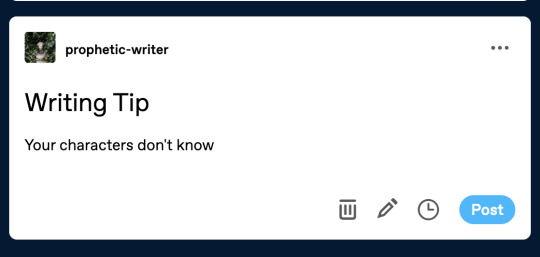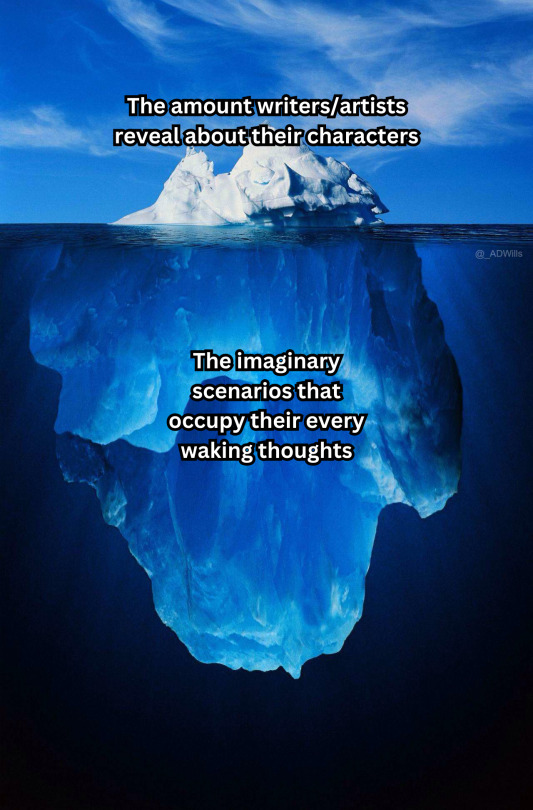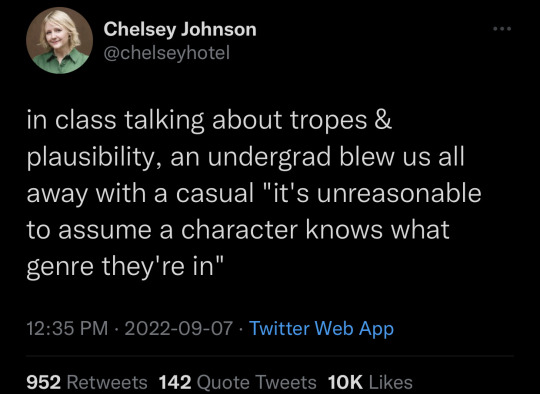Text
Small fantasy worldbuilding elements you might want to think about:
A currency that isn’t gold-standard/having gold be as valuable as tin
A currency that runs entirely on a perishable resource, like cocoa beans
A clock that isn’t 24-hours
More or less than four seasons/seasons other than the ones we know
Fantastical weather patterns like irregular cloud formations, iridescent rain
Multiple moons/no moon
Planetary rings
A northern lights effect, but near the equator
Roads that aren’t brown or grey/black, like San Juan’s blue bricks
Jewelry beyond precious gems and metals
Marriage signifiers other than wedding bands
The husband taking the wife's name / newlyweds inventing a new surname upon marriage
No concept of virginity or bastardry
More than 2 genders/no concept of gender
Monotheism, but not creationism
Gods that don’t look like people
Domesticated pets that aren’t re-skinned dogs and cats
Some normalized supernatural element that has nothing to do with the plot
Magical communication that isn’t Fantasy Zoom
“Books” that aren’t bound or scrolls
A nonverbal means of communicating, like sign language
A race of people who are obligate carnivores/ vegetarians/ vegans/ pescatarians (not religious, biological imperative)
I’ve done about half of these myself in one WIP or another and a little detail here or there goes a long way in reminding the audience that this isn’t Kansas anymore.
36K notes
·
View notes
Text
sometimes you need dialogue tags and don't want to use the same four


157K notes
·
View notes
Text
Journalism in Worldbuilding
I'm currently reading Iron Flame by Rebecca Yarros and it has really got me thinking about journalism and information, especially as it relates to worldbuilding. I'm working on my own space opera fantasy where there's a corrupt government structure, so information and knowledge are important considerations. But they seem to tie into so many different areas that I haven't really separated them out and thought about them separately yet.
Yarros' book inspired me to do so and I came up with this long list of questions that I hope someone else can find helpful as well. Journalism and information are integral parts of our culture and history and, in addition to weaving closely with lots of elements of worldbuilding, they can also help you think about your plot and your characters.
Here's my list (in very messy order):
What comprises the "official" media (newspapers, official notices, reports, briefs)? How many people are in control of it/have the ability to tamper with it every day? How often is it circulated? How does it pass from person to person?
How do people on the far edges of your world get their news? How do people living in cities get their news? Rural areas? What about people in the slums and pits of the cities? What about middle class people? Elite/rich people? To what degree are each of these groups able to receive information? Is it first-hand? Second-hand? Third-hand? Spoofing on this: how does rank affect what information is known or unknown (this can also relate to cultural or historical knowledge, not just current events)? Do lower members of society know more or less than the higher members of society?
Which overarching body controls the news (e.g. government, syndicate, company, conglomerate, non-profit, etc.)? Is it a combination of different bodies? If so, how do they interact with each other? Is there a ringleader? Internal corruption? Is everything done by machine or by hand?
How does language impact what gets printed and what doesn't? Are there dead languages? Is there a common language? Are there multiple common languages? Can something happen without anyone being able to understand exactly what happened? How does that impact public perception of different places/peoples?
Is the news truthful? Is it only partially truthful? Is it a total lie? Are some things omitted and, if so, what parts?
What other sources are available for giving and receiving news? Does social media exist? Do people send letters? Are letters tightly controlled? Is there any privacy to these things? Are there trading posts where information is shared or traded?
Is information generally compartmentalized or generally open? Is there a difference in the perception versus the reality? (This can be part of your world's culture or history, too.)
Are there societies in your world that have knowledge keepers? How do those knowlege keepers learn and share information with the rest of the society? How do societies with these structures interact with each other and with societies with different structures?
Is knowledge prized or considered insignificant? Do different levels of society think differently on this point? Do different societies within your world think differently on this point?
Can knowledge be weaponized? Can it be used against others, for good or for bad? How? (Think about this by thinking about the channels through which information currently flows and how those channels can be affected/changed.)
#writing#writeblr#creative writing#writers#worldbuilding#history#culture#writing characters#writing tip#writing advice#plotting
49 notes
·
View notes
Text
ultimate character development template
basics
name: meaning of name: nicknames/titles: age: gender: location: birthday: strengths + example where it's shown: weaknesses + example where it's shown: how it affects others:
emotional depth
attachment style + how it manifests in the story: physical fear: emotional/abstract fear: happy memory: sad memory: object of significance: philosophical outlook/belief: what characters are ignorant about themselves: how confident are they: goal: long-term dreams: what they're embarrassed/ashamed to tell others about: regrets: source of pride: source of misery: what they admire above all else: do they believe in fate:
personality
mbti: enneagram: big five: character archetype: star sign: who they pretend to be on the outside: who they actually are/how they feel towards the mask: mental health conditions: how it manifests for them: iq: eq: humour: reputation:
habits
bad habits: mannerisms when stressed: mannerisms when content: mannerisms when scared: mannerisms normally: verbal mannerisms/distinctive speaking style: how do they move across a room: what do they say and what remains unsaid: how they express love: hobbies:
appearance
defining features: eye shape + colour: hair texture + colour: skin texture + tone: vibe: height: build: clothing: any bodily disfigurement (scars, etc.): overall attractiveness: their opinion on their appearance: appeals to:
relationships
who they trust most: what they wish they could do for them: what's holding them back: who they hate most: what they wish they could do to them: what's holding them back: relationship with the protagonist: relationship with the antagonist: siblings: relationship with them: parents/step-parents: relationship with them: previous broken relationships: why did it break: what others expect of them: who believes in them: their mentor character/who they look up to: political/religious/other affiliations: what makes them different from every other character: non-human relationships + why: romantic "type" + why: relationship dynamics:
backstory/background
primary emotion towards their past: primary feelings while in their past: where did they grow up: defining incidents: earliest childhood memory: saddest memory: happiest memory: major accomplishments: their opinion on it: notable people in their backstory: effect on them today: trauma: what have they already lost: financial circumstance:
progression
why are they important (eg. why're they the only one able to do something?): what do they learn about themselves throughout the story: what do they learn about the world: how do they feel towards their newfound knowledge: character arc (positive, negative, neutral): how relationships change because of their actions: what mistakes do they make: what scene is their character highlighted: do they get what they want: why or why not: what happens to them after the story ends:
13K notes
·
View notes
Text
WRITING PROMPTS - Beach
Beaches are the gateway between the humans and merfolk, and they're the most dangerous places on earth.
"I have sand in places that should never ever have sand!"
A child digs a hole in the sand of the beach, and finds treasure left behind by long-dead pirates.
"Where did the water go?"
11 notes
·
View notes
Text
I'm sorry but I have one draft that I never finished but I laugh every time I see it

64K notes
·
View notes
Text
The symbolism of flowers
Flowers have a long history of symbolism that you can incorporate into your writing to give subtext.
Symbolism varies between cultures and customs, and these particular examples come from Victorian Era Britain. You'll find examples of this symbolism in many well-known novels of the era!
Amaryllis: Pride
Black-eyed Susan: Justice
Bluebell: Humility
Calla Lily: Beauty
Pink Camellia: Longing
Carnations: Female love
Yellow Carnation: Rejection
Clematis: Mental beauty
Columbine: Foolishness
Cyclamen: Resignation
Daffodil: Unrivalled love
Daisy: Innocence, loyalty
Forget-me-not: True love
Gardenia: Secret love
Geranium: Folly, stupidity
Gladiolus: Integrity, strength
Hibiscus: Delicate beauty
Honeysuckle: Bonds of love
Blue Hyacinth: Constancy
Hydrangea: Frigid, heartless
Iris: Faith, trust, wisdom
White Jasmine: Amiability
Lavender: Distrust
Lilac: Joy of youth
White Lily: Purity
Orange Lily: Hatred
Tiger Lily: Wealth, pride
Lily-of-the-valley: Sweetness, humility
Lotus: Enlightenment, rebirth
Magnolia: Nobility
Marigold: Grief, jealousy
Morning Glory: Affection
Nasturtium: Patriotism, conquest
Pansy: Thoughtfulness
Peony: Bashfulness, shame
Poppy: Consolation
Red Rose: Love
Yellow Rose: Jealously, infidelity
Snapdragon: Deception, grace
Sunflower: Adoration
Sweet Willian: Gallantry
Red Tulip: Passion
Violet: Watchfulness, modesty
Yarrow: Everlasting love
Zinnia: Absent, affection
60K notes
·
View notes
Text
I find it personally offensive how many bad writers can get published so easily.
44K notes
·
View notes
Text
🎉 Write characters that you find interesting and compelling.
🎉 Don't worry about making characters too over the top, or 'too much'.
🎉 Write characters who want big things.
🎉 Write characters with conflict between what they want and what they need.
🎉 Write characters who don't realize they are doing harm.
🎉 Write characters who don't know how to communicate well.
🎉 Write characters with people they love in the way of what they want.
🎉 Write characters with amazing abilities who use them in ways that unintentionally fuck them over.
🎉 Write messy characters!
5K notes
·
View notes
Text
if you write a strong character, let them fail.
if you write a selfless hero, let them get mad at people.
if you write a cold-hearted villain, make them cry.
if you write a brokenhearted victim, let them smile again.
if you write a bold leader, make them seek guidance.
if you write a confident genius, make them be wrong, or get stumped once in a while.
if you write a fighter or a warrior, let them lose a battle, but let them win the war.
if you write a character who loses everything, let them find something.
if you write a reluctant hero, give them a reason to fight.
credit:@aj-eddy
11K notes
·
View notes
Text

82K notes
·
View notes
Text
A Quick Guide to Colour Symbolism
Colour symbolism has been a long-standing part of the writers' craft. Colours can hold different meanings across various cultures, but here are some common examples of some colours and their associated imagery.
🍎 Red: Love, lust, anger, danger, violence, passion
💎 Blue: Tranquillity, calm, peace, sadness, isolation
🥬 Green: Jealousy, rebirth, growth, greed, renewal
♠️ Black: Death, sadness, loss, grief, evil, depression
🎀 Pink: Sweetness, love, kindness, innocence
🍊 Orange: Joy, creativity, energy, excitement
🌼 Yellow: Joy, cowardice, innocence, optimism
🏳️ White: Innocence, faith, peace, purity, mourning
🐴 Brown: Stability, comfort, predictability, boredom
💟 Purple: Royalty, bravery, virtue, luxury, spirituality
3K notes
·
View notes
Text
Deepest apologies to the well-thought-out characters that I created but never wrote the stories for.
14K notes
·
View notes
Text
questions to make each character unique**
** y'all you don't need to be able to answer all of these for every single character. just things to think of :]
have they / would they dye their hair?
do they maintain eye contact when talking?
what is their tell for lying?
do they have an accent?
what languages do they speak?
what kind of music do they listen to?
describe them in one word. what could happen to make them the opposite?
do they have any ghosts?
what is their worst fear?
what is a secret they do not tell anyone?
what motto do they live by?
if they were a famous figure, who would they be?
what great moment shaped them to be who they are? have they lived through the moment yet?
what is their fatal flaw?
how do they feel about jewelry? painted nails?
what kind of art are they?
do they play a sport?
do they have a speech impairment? how would that translate across paper?
what could you do to betray their trust?
what makes them smile?
if you had to choose something to make them go all john wick, who would it be?
do they swear? in what language?
how comfortable do they feel around strangers?
are they extraverted or introverted?
do they stand straight? what is their posture like?
what is their sleep schedule like
would they consciously invade someone else's body space? even a stranger's?
how do they feel about contact with other people? do they flinch?
are they the first to hug?
what would make them kill / stop them from killing?
how do they smile? do they have dimples?
what about their teeth -- braces? sharp teeth? dentures? yellow teeth? what about spots?
how do they get others' attention? clear their throat? punch them?
do they talk with their hands?
what is their final goal?
how would they describe happiness?
what is their biggest conflict? it doesn't need to be big for everyone else, only for them.
how do they react to death?
do they cry? how do they cry -- silent tears, sobbing, a swallow?
how do they react when someone else is crying? can they comfort a stranger?
how are they around pets? are they allergic to any?
following up, do they have allergies?
do they take off their shoes going into a stranger's house? would they offer to do the dishes?
do they call strangers by their first name or title?
how do they show fear? trying to hide it? shaking? etc.
what is their impact on other characters?
how could any of these change by the end of the story?
3K notes
·
View notes
Text
Character motivations for fictional characters
1. Revenge: Seeking vengeance for a past wrong or harm.
2. Power: Craving dominance and control over others.
3. Love and Relationships: Longing for love, companionship, and emotional connection.
4. Redemption: Seeking to atone for past mistakes and find forgiveness.
5. Survival: Striving to stay alive in dangerous or challenging circumstances.
6. Justice: Fighting against injustice and upholding fairness.
7. Exploration: Satisfying curiosity and a desire for discovery.
8. Ambition: Relentlessly pursuing success and achievement.
9. Freedom: Seeking liberation from oppression and constraints.
10. Knowledge and Wisdom: Thirsting for knowledge, understanding, and wisdom.
11. Family: Protecting and nurturing one's family and loved ones.
12. Acceptance: Craving acceptance and validation from others.
13. Friendship: Building and maintaining meaningful friendships.
14. Escape: Seeking to break free from a stifling or undesirable situation.
15. Truth: Uncovering the truth and exposing lies or deceit.
16. Creativity: Expressing oneself and bringing imagination to life.
17. Competition: Striving to be the best and outperform others.
18. Self-Discovery: Embarking on a journey to understand oneself better.
19. Healing: Seeking emotional, physical, or spiritual healing.
20. Faith and Belief: Holding strong religious or spiritual convictions.
21. Mentorship: Guiding and inspiring others to reach their potential.
22. Revolution: Fighting against oppressive systems and advocating for change.
23. Sacrifice: Putting others' needs above one's own and making difficult choices.
24. Fear: Overcoming fears and finding strength in the face of adversity.
25. Fame: Desiring recognition, acclaim, and celebrity status.
26. Identity: Discovering and understanding one's true self.
27. Empathy: Understanding and connecting with others' emotions and experiences.
28. Tradition: Upholding cultural or familial traditions and values.
29. Rebellion: Resisting authority and challenging the status quo.
4K notes
·
View notes

